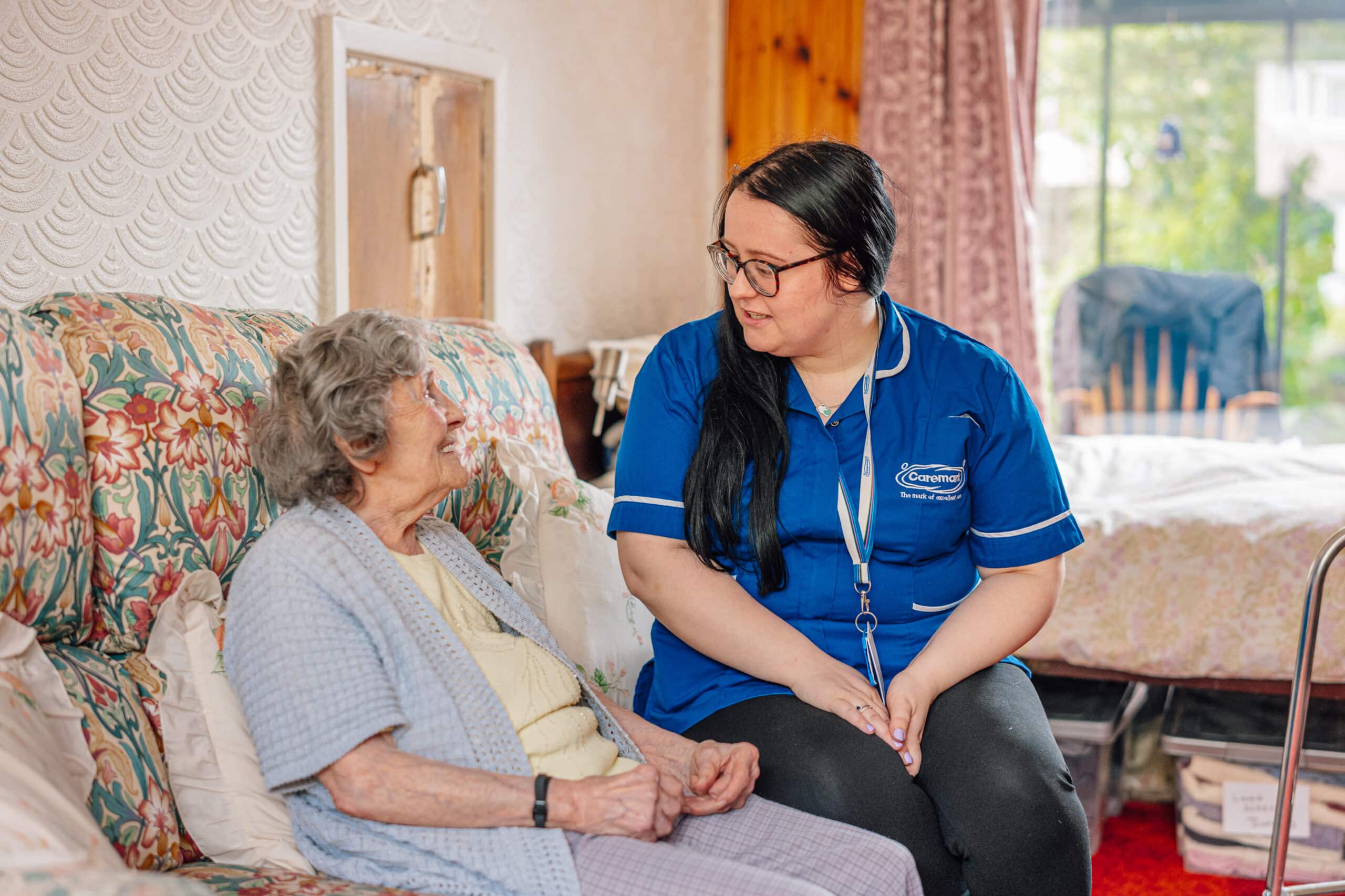Understanding Dementia and How Caremark NI Can Help

Dementia is one of the most pressing global health concerns today, affecting over 55 million people worldwide currently, which is expected to rise to 78 million by 2030 (World Health Organisation). As our population ages, understanding Dementia in NI has never been so important. In this blog post, we’ll cover what dementia is, why it’s becoming more common, the early symptoms to look out for, and what causes it.
What is Dementia?
Dementia is not a specific disease; it is an umbrella term used to describe a decline in cognitive function severe enough to interfere with daily life. It is a group of symptoms that individuals may experience if they are living with diseases and injuries, such as Alzheimer’s disease or stroke, that affect memory thinking, reasoning, language, and the ability to perform everyday tasks.
While dementia primarily affects older adults, it is not a normal part of aging. The most common type of dementia is Alzheimer’s disease, which is responsible for 60% to 80% of all cases.
Although the overall number of dementia cases is rising, especially in aging populations, improvements in cardiovascular health, education, and lifestyle changes have helped reduce individual risk.
What Are The Causes?
Dementia results from damage to brain cells, which disrupts their ability to communicate with each other. This damage can be caused by a range of diseases and conditions, including:
- Alzheimer’s disease: abnormal protein build-up in the brain
- Vascular dementia: reduced blood flow due to stroke or vascular damage
- Lewy body dementia: protein deposits (Lewy bodies) that affect brain function
- Frontotemporal dementia (FTD): damage to the frontal and temporal lobes
- Korsakoff Syndrome: excessive alcohol use
- Huntington’s Disease: an inherited condition that damages nerve cells in the brain
- Parkinson’s: a progressive neurological condition that primarily affects movement
Thinking and memory problems may also be caused by conditions that can be addressed and treated, however with dementia, most changes are permanent and get worse over time. Conditions that can be treated, and therefore improve dementia-like symptoms include:
- Vitamin deficiencies
- Thyroid problems
- Excessive consumption of alcohol
- Depression
- Side effects of certain medications

Early Warning Signs of Dementia:
Recognising and understanding the early signs of dementia is where Caremark NI can help you, as the symptoms that come along with it early can lead to better care and management. Although there is no one test to identify a dementia diagnosis, doctors will examine an individual’s medical history, carry out physical examinations and laboratory tests, and look at any characteristic changes in the behaviour of patients. Here are the most common early-stage dementia symptoms to look out for:
- Memory loss
This may include forgetting recent information, appointments, or conversations, and repeating the same questions or stories.
2. Difficulty solving problems or planning
Individuals may have trouble managing finances, recipes or schedules, and you may notice a decrease in concentration while carrying out activities.
3. Trouble completing familiar tasks
Completing tasks that have been part of their routine for years, for example using household appliances or driving familiar routes, may become a difficult task for someone with dementia.
4. Confusion with the time or places
Individuals may lose track of dates or seasons, and may begin to get lost in places they are familiar with. This may be easily identifiable if they forget where they are and how they got to that place.
5. Problems with words
This could involve pausing mid-sentence and not knowing how to continue, struggling to find the right words, or calling things by the wrong name.
6. Misplacing items
Individuals may begin to put things in unusual places, e.g. keys in the fridge, and may become incapable of retracing their steps.
7. Mood and personality changes
You may notice that individuals start to avoid conversations, hobbies that they used to enjoy, or social gatherings. They may also become unusually anxious, depressed, fearful, suspicious or get upset easily.
8. Poor judgement
Falling for scams, giving away money, and making unwise financial decisions may be a sign of dementia. Individuals may also neglect their personal hygiene or wear inappropriate clothing for the weather.
When should you see a doctor?
If the above symptoms are interfering with your daily life, or are becoming more frequent, it’s important to consult a doctor. Although some symptoms may lead to a diagnosis of a different health condition such as depression or an infection, getting an early dementia diagnosis will help you and your family prepare for the future. You may also seek additional support from websites such as Next Steps, part of the Dementia Change Action Network, or the NHS.
How Cn Caremark NI Support You and Help You Understand Dementia?
At Caremark NI, we recognise the emotional weight that comes with supporting someone you love through their dementia journey. It’s never easy, and you don’t have to face it alone. Our teams work with the families of those diagnosed with dementia to ensure they don’t become overwhelmed.
Dementia affects everybody in different ways and at different stages, whether it be their memory, mood, communication, or behaviour. That’s why we take the time to get to know each individual, their history, routines, and preferences. We tailor our care to fit their unique needs, adapting as those needs change over time.
We also have a dedicated Memory Café which provides an opportunity for those diagnosed with dementia or Alzheimer’s to come along and socialise with others. Come along to take part in various activities, enjoy a catch up over a cuppa, and reminisce our favourite songs over the decades!
If you would like to understand more about how we can support you or a loved one with dementia (or if you do not have a diagnosis but require home care), please get in touch using the form below or calling 028 91 467 004.